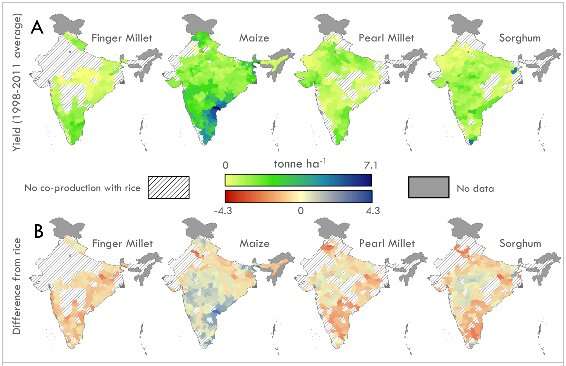Researchers study how climate change affects crops in India

Kyle Davis is an environmental data scientist whose research seeks to increase food supplies in developing countries. He combines techniques from environmental science and data science to understand patterns in the global food system and develop strategies that make food-supply chains more nutritious and sustainable.
Since joining the Data Science Institute as a postdoctoral fellow in September 2018, Davis has co-authored four papers, all of which detail how developing countries can sustainably improve their crop production. For his latest study, he focuses on India, home to 1.3 billion people, where he led a team that studied the effects of climate on five major crops: finger millet, maize, pearl millet, sorghum and rice. These crops make up the vast majority of grain production during the June-to-September monsoon season—India's main growing period—with rice contributing three-quarters of the grain supply for the season. Taken together, the five grains are essential for meeting India's nutritional needs.
And in a paper published in Environmental Research Letters, Davis found that the yields from grains such as millet, sorghum, and maize are more resilient to extreme weather; their yields vary significantly less due to year-to-year changes in climate and generally experience smaller declines during droughts. But yields from rice, India's main crop, experience larger declines during extreme weather conditions. "By relying more and more on a single crop—rice—India's food supply is potentially vulnerable to the effects of varying climate," said Davis, the lead author on the paper, "Sensitivity of Grain Yields to Historical Climate Sensitivity in India," which has four co-authors, all of whom collaborated on the research.
"Expanding the area planted with these four alternative grains can reduce variations in Indian grain production caused by extreme climate, especially in the many places where their yields are comparable to rice," Davis added. "Doing so will mean that the food supply for the country's massive and growing population is less in jeopardy during times of drought or extreme weather."
Temperatures and rainfall amounts in India vary from year to year and influence the amount of crops that farmers can produce. And with episodes of extreme climate such as droughts and storms becoming more frequent, it's essential to find ways to protect India's crop production from these shocks, according to Davis.
The authors combined historical data on crop yields, temperature, and rainfall. Data on the yields of each crop came from state agricultural ministries across India and covered 46 years (1966-2011) and 593 of India's 707 districts. The authors also used modelled data on temperature (from the University of East Anglia's Climate Research Unit) and precipitation (derived from a network of rain gauges maintained by the Indian Meteorological Department). Using these climate variables as predictors of yield, they then employed a linear mixed effects modelling approach—similar to a multiple regression ? to estimate whether there was a significant relationship between year-to-year variations in climate and crop yields.
"This study shows that diversifying the crops that a country grows can be an effective way to adapt its food-production systems to the growing influence of climate change," said Davis. "And it adds to the evidence that increasing the production of alternative grains in India can offer benefits for improving nutrition, for saving water, and for reducing energy demand and greenhouse gas emissions from agriculture."
More information: Kyle Frankel Davis et al. Sensitivity of grain yields to historical climate variability in India, Environmental Research Letters (2019). DOI: 10.1088/1748-9326/ab22db
Journal information: Environmental Research Letters
Provided by Columbia University

















